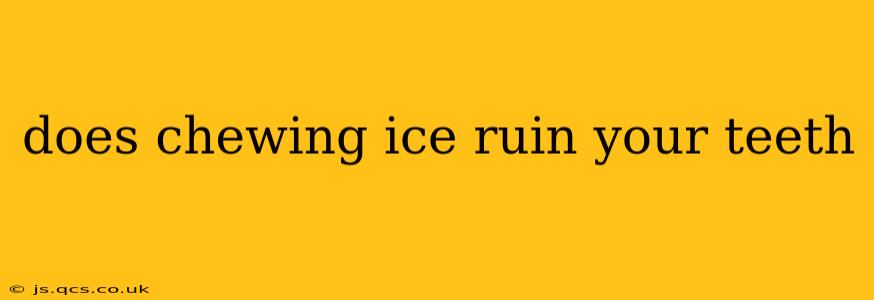Many of us enjoy the refreshing crunch of ice, especially on a hot day. But is this seemingly harmless habit actually damaging our teeth? The short answer is: yes, chewing ice can significantly harm your teeth over time. This article will explore the detrimental effects of chewing ice, answer common questions, and offer advice on how to break the habit.
What Happens When You Chew Ice?
The enamel, the hard outer layer of your teeth, is the strongest substance in the human body. However, it's not indestructible. Chewing ice puts immense pressure on your teeth, far exceeding the force exerted when chewing normal food. This pressure can lead to several problems:
-
Cracked Teeth: The most common consequence of chewing ice is the development of cracks in your teeth. These cracks can be microscopic at first, leading to sensitivity and eventually progressing to larger fractures requiring extensive dental work, including fillings, crowns, or even root canals.
-
Chipped Teeth: The force of chewing ice can also chip away at the enamel, creating noticeable chips and imperfections in your teeth's surface. This not only affects the aesthetics of your smile but also leaves your teeth vulnerable to further damage and decay.
-
Worn Enamel: Repeatedly chewing ice gradually wears down the enamel, making your teeth more susceptible to cavities and sensitivity. Thinned enamel is more prone to staining and discoloration, too.
-
Tooth Sensitivity: As the enamel wears down, the dentin (the layer beneath the enamel) becomes exposed. Dentin contains microscopic tubules that lead to the nerves within your teeth, resulting in increased sensitivity to hot, cold, sweet, or acidic foods and drinks.
How Can I Tell if Chewing Ice is Harming My Teeth?
Recognizing the early signs of ice-chewing damage is crucial for preventing more extensive problems. Look out for these symptoms:
- Sudden, sharp tooth pain: This is a common sign of cracked or chipped teeth.
- Sensitivity to temperature changes: If your teeth become unusually sensitive to hot or cold, it could indicate enamel erosion.
- Visible chips or cracks: Examine your teeth closely in a mirror for any noticeable damage.
- Discoloration: Worn enamel can lead to discoloration or staining.
Can I Chew Ice Occasionally Without Damage?
While the occasional piece of ice probably won't cause significant harm, making it a habit is risky. The cumulative effect of repeatedly chewing ice is what leads to serious dental problems. It's best to avoid chewing ice altogether to protect your teeth's long-term health.
What Are Some Alternatives to Chewing Ice?
If you crave the cooling sensation of ice, there are healthier alternatives:
- Frozen fruit: Fruits like grapes or berries provide a refreshing, cool sensation without the risk of damaging your teeth.
- Ice water: Drinking cold water is a much safer way to cool down.
- Sugar-free ice pops: These provide a sweet and cool treat without the abrasive effect of ice.
How Can I Stop Chewing Ice?
Breaking a habit can be challenging, but there are strategies to help you stop chewing ice:
- Identify triggers: Understanding why you chew ice (stress, boredom, habit) is the first step.
- Replace the behavior: Substitute ice chewing with one of the healthier alternatives mentioned above.
- Seek professional help: If you struggle to break the habit on your own, consider seeking help from a therapist or counselor.
Does chewing ice cause other problems?
While the primary concern is damage to the teeth, constantly chewing ice could potentially lead to temporomandibular joint (TMJ) disorders due to the strain placed on the jaw muscles and joints. This can result in jaw pain, clicking, and headaches.
Is it better to chew ice slowly or quickly?
There's no safe way to chew ice. Regardless of the speed, the abrasive nature of ice and the force applied to your teeth will cause damage over time.
By understanding the potential risks associated with chewing ice and adopting healthier alternatives, you can protect your smile and maintain optimal oral health. Remember, your teeth are an investment worth protecting!
